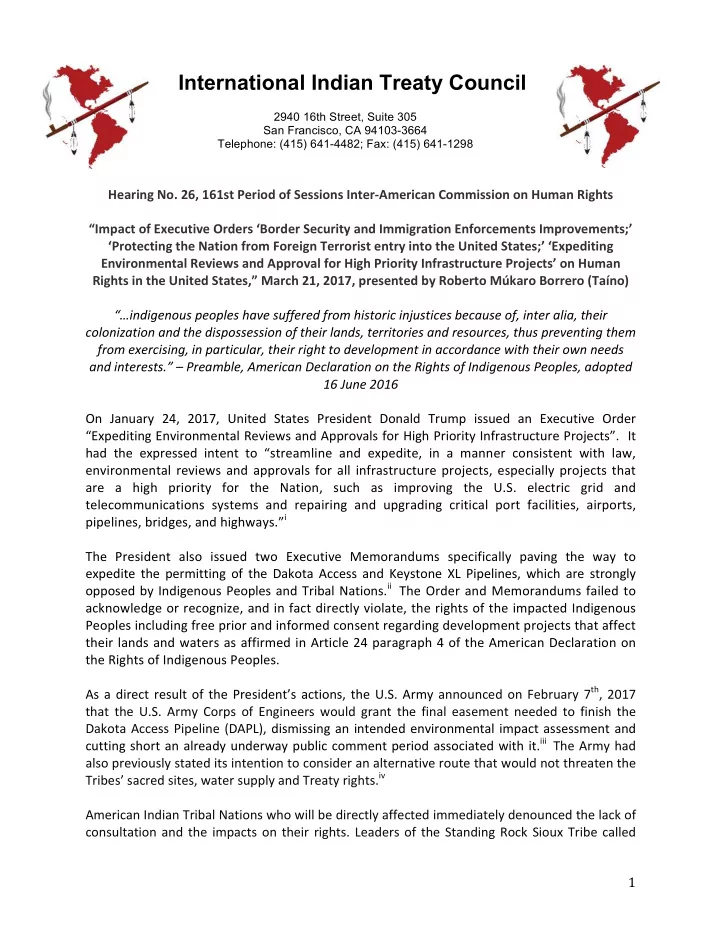

International Indian Treaty Council 2940 16th Street, Suite 305 San Francisco, CA 94103-3664 Telephone: (415) 641-4482; Fax: (415) 641-1298 Hearing No. 26, 161st Period of Sessions Inter‐American Commission on Human Rights “Impact of Executive Orders ‘Border Security and Immigration Enforcements Improvements;’ ‘Protecting the Nation from Foreign Terrorist entry into the United States;’ ‘Expediting Environmental Reviews and Approval for High Priority Infrastructure Projects’ on Human Rights in the United States,” March 21, 2017, presented by Roberto Múkaro Borrero (Taíno) “…indigenous peoples have suffered from historic injustices because of, inter alia, their colonization and the dispossession of their lands, territories and resources, thus preventing them from exercising, in particular, their right to development in accordance with their own needs and interests.” – Preamble, American Declaration on the Rights of Indigenous Peoples, adopted 16 June 2016 On January 24, 2017, United States President Donald Trump issued an Executive Order “Expediting Environmental Reviews and Approvals for High Priority Infrastructure Projects”. It had the expressed intent to “streamline and expedite, in a manner consistent with law, environmental reviews and approvals for all infrastructure projects, especially projects that are a high priority for the Nation, such as improving the U.S. electric grid and telecommunications systems and repairing and upgrading critical port facilities, airports, pipelines, bridges, and highways.” i The President also issued two Executive Memorandums specifically paving the way to expedite the permitting of the Dakota Access and Keystone XL Pipelines, which are strongly opposed by Indigenous Peoples and Tribal Nations. ii The Order and Memorandums failed to acknowledge or recognize, and in fact directly violate, the rights of the impacted Indigenous Peoples including free prior and informed consent regarding development projects that affect their lands and waters as affirmed in Article 24 paragraph 4 of the American Declaration on the Rights of Indigenous Peoples. As a direct result of the President’s actions, the U.S. Army announced on February 7 th , 2017 that the U.S. Army Corps of Engineers would grant the final easement needed to finish the Dakota Access Pipeline (DAPL), dismissing an intended environmental impact assessment and cutting short an already underway public comment period associated with it. iii The Army had also previously stated its intention to consider an alternative route that would not threaten the Tribes’ sacred sites, water supply and Treaty rights. iv American Indian Tribal Nations who will be directly affected immediately denounced the lack of consultation and the impacts on their rights. Leaders of the Standing Rock Sioux Tribe called 1
these Executive actions “an attack on tribal sovereignty.” v Leaders of the Yankton Sioux Tribe of South Dakota stated the administration’s actions are “clearly arbitrary and capricious” and “in violation of the Administrative Procedures Act.” vi On March 14, in D.C. District Court, the Cheyenne River Sioux Tribe was denied an emergency injunction they requested due to the “ultimate harm to Tribal members’ free exercise of religion” which would result from the introduction of oil into the DAPL. vii The U.S. Court of Appeals for the District of Columbia Circuit denied their appeal, filed jointly with the Standing Rock Sioux Tribe, on March 18th. viii U.S. Rep. Raul Ruiz (D‐CA) and others on the U.S. House of Representatives Committee on Natural Resources also challenged the order, stating “Tribes have a right to have a say in any decisions that may impact their health, land, and cultural survival.” ix It is the view of the International Indian Treaty Council (IITC) that the January 24 th Executive Order and the Presidential Memoranda deny Indigenous Peoples’ right to due process, violate federal law, federal trust responsibility, and disregard international human rights norms, principles and standards and to which the U.S. is obligated. x They also display a flagrant disregard for federal legal process. Of particular importance to this Commission are the provisions in the United Nations and the American Declaration on the Rights of Indigenous Peoples affirming self‐determination; free, prior, and informed consent; the preservation of sacred sites and religious practices; and Treaties between Indigenous Peoples and States. xi The IITC further asserts that the President does not have the legal or moral authority to violate the U.S. Constitution, which states “treaties are the supreme law of the land.” In fact, the U.S. Supreme Court, in 1980, recognized the duplicity of the US government in breaching its treaty obligations under the 1861 Ft. Laramie Treaties concluded with the “Great Sioux Nation”. xii These actions also ignore recent recommendations of UN Treaty Bodies to the United States. The UN Committee on the Elimination of Racial Discrimination in its concluding observations on the combined seventh to ninth periodic reports of United States of America in 2014 recalled its general recommendation No. 23 (1997) on Indigenous Peoples, xiii and called upon the U.S. to: a. Guarantee, in law and in practice, the right of indigenous peoples to effective participation in public life and in decisions that affect them based on their free, prior and informed consent; and b. Adopt concrete measures to effectively protect the sacred sites of indigenous peoples as a result of the State party’s development or national security projects and exploitation of natural resources, and ensure that those responsible for any damages caused are held accountable. Likewise, the UN Human Rights Committee’s Concluding Observations on its 2014 review of the US addressed the issue of sacred sites, areas and places and recommended that the US uphold the right of Indigenous Peoples to free prior and informed consent in this regard. xiv 2
Recommend
More recommend